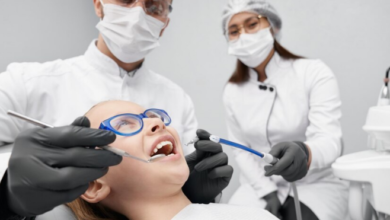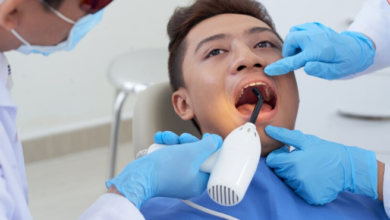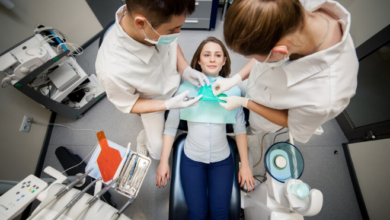Finding the Best Emergency Dentist in Cape Coral: Your Guide to Urgent Dental Care

Key Qualities of An Emergency Dentist in Cape Coral
Finding the right emergency dentist in cape coral when you’re in pain can feel overwhelming. It’s important to know what to look for so you can get the care you need quickly. Not all dentists are the same, especially when it comes to handling emergencies. You want someone who is prepared and ready to help when you need it most. Maybe you also need dental implants in cape coral or teeth whitening cape coral, but right now, you need help!
Availability for Urgent Care
When a dental emergency strikes, time is super important. You need a dentist cape coral fl who can see you ASAP. Here’s what to consider:
- Extended Hours: Does the dentist offer evening or weekend appointments? Emergencies rarely happen during normal business hours.
- 24/7 Availability: Some practices have dentists on call around the clock. This can be a lifesaver for severe issues.
- Same-Day Appointments: Can they get you in on the same day you call? This is crucial for addressing problems before they worsen.
Experience with Dental Emergencies
Not every dentist has tons of experience with emergency situations. Look for these indicators:
- Specific Training: Has the root canal specialist cape coral completed additional training in emergency dental care?
- Wide Range of Services: Can they handle everything from toothaches to broken teeth to soft tissue injuries?
- Positive Reviews: Do other patients praise their ability to handle emergencies effectively?
Advanced Equipment and Technology
A modern dental office is better equipped to handle emergencies efficiently. Consider these factors:
- Digital X-Rays: These provide quick and clear images for accurate diagnosis.
- 3D Scanning: This technology allows for precise treatment planning, especially for procedures like dental implants cape coral.
- In-House Lab: Having an on-site lab can speed up the process for things like dentures cape coral repairs. Finding a good family dentist cape coral is important, but for emergencies, you need someone ready to go!
Understanding Dental Emergencies
Dental emergencies can be scary, and knowing what qualifies as one is super important. It helps you decide when to rush to an emergency dentist in Cape Coral versus when you can wait for a regular appointment. Basically, if it feels serious or is causing you a lot of pain, it’s better to be safe than sorry.
What Qualifies as a Dental Emergency
So, what exactly is a dental emergency? It’s any situation that needs immediate attention to stop severe pain, bleeding, or save a tooth. It’s more than just a minor toothache; it’s something that can seriously affect your health if you don’t get it checked out quickly. Here are some examples:
- Uncontrolled bleeding in your mouth
- Severe pain that doesn’t go away with over-the-counter painkillers
- A knocked-out tooth
Signs You Need Immediate Dental Care
Sometimes it’s obvious you need to see a dentist right away, but other times it’s not so clear. Here are some signs that mean you shouldn’t wait:
- Persistent Bleeding: If you can’t stop the bleeding after applying pressure for 15-20 minutes, that’s a red flag.
- Severe Swelling: Swelling in your mouth or face can indicate a serious infection that needs immediate treatment.
- Knocked-Out Tooth: The sooner you get to a dentist, the better the chance of saving the tooth. Time is of the essence!
- Intense Pain: Pain that’s unbearable and doesn’t respond to medication is a sign something is seriously wrong.
Common Types of Dental Emergencies
Dental emergencies come in different forms. Knowing what they are can help you understand what to do if one happens to you. Here are some common ones:
- Toothaches: While not all toothaches are emergencies, severe ones caused by infection or decay definitely are.
- Broken or Cracked Teeth: These can be very painful and need prompt treatment to prevent further damage.
- Lost Fillings or Crowns: While not always urgent, they can expose the tooth to bacteria and cause pain, so they should be addressed quickly.
- Abscesses: These are infections that form at the root of a tooth and can spread to other parts of your body if left untreated. They’re serious and need immediate attention.
What to Expect During Your Emergency Visit
So, you’ve got a dental emergency and you’re heading to the dentist. What happens next? Knowing what to expect during your emergency visit can really help calm your nerves. It’s not as scary as it seems, I promise!
Initial Assessment and Consultation
First things first, the dentist will want to figure out what’s going on. This usually involves:
- A quick chat about your symptoms: They’ll ask what hurts, when it started, and anything else that might be relevant.
- A physical exam: The dentist will take a look inside your mouth to see the problem firsthand.
- X-rays (maybe): Sometimes, they need to see what’s happening beneath the surface, so they might take an X-ray.
After the assessment, the dentist will explain what they found and what needs to be done. Don’t be afraid to ask questions! It’s important to understand what’s happening and why.
Types of Treatments Offered
Emergency dentists offer a range of treatments, depending on the issue. Here are a few common ones:
- Pain relief: This could be anything from a simple painkiller to a local anesthetic to numb the area.
- Repairing damaged teeth: Fillings, crowns, or bonding can fix chipped, cracked, or broken teeth.
- Tooth extractions: If a tooth is too damaged to save, they might need to pull it.
- Treating infections: Antibiotics and other treatments can help clear up infections.
The goal is to address the immediate problem and get you out of pain as quickly as possible.
How to Prepare for Your Appointment
To make things easier, here’s what you can do to prepare:
- Bring your insurance card and ID: This will speed up the paperwork process.
- List your medications and allergies: The dentist needs to know about any medications you’re taking or allergies you have.
- Note down your symptoms: Writing down when the pain started and what makes it better or worse can be super helpful.
- Arrive a bit early: This gives you time to fill out any necessary forms and relax before your appointment.
Being prepared can make the whole experience a lot less stressful. Knowing what to expect during your emergency visit can help you feel more in control.
Questions to Ask Your Emergency Dentist
When you’re dealing with a dental emergency in Cape Coral, it’s easy to feel overwhelmed. Asking the right questions can really help calm your nerves and make sure you’re getting the best care possible. Don’t be shy – speak up and get the info you need. Here are some key questions to consider when consulting with an emergency dentist.
Inquire About Treatment Options
It’s important to fully understand what your emergency dentist plans to do. Don’t be afraid to ask for details! Here are some questions to consider:
- What are all the possible ways to fix my problem?
- What are the pros and cons of each treatment option?
- Which treatment do you recommend and why?
Ask About Costs and Insurance
Let’s face it, dental work can be expensive, especially when it’s an emergency. It’s a good idea to get a clear understanding of the costs involved upfront. Here’s what you should ask:
- How much will the treatment cost?
- Do you accept my insurance?
- Do you offer payment plans or financing options?
Understand Follow-Up Care
After your emergency treatment, it’s important to know what to expect next. Proper follow-up care is key to a successful recovery. Make sure to ask:
- What kind of follow-up care will I need?
- How often will I need to come back for check-ups?
- What can I do at home to help with healing?
Importance of Location in Emergency Dental Care
When you’re dealing with a dental emergency, the last thing you want to do is drive all over Cape Coral. The importance of location can’t be overstated when you’re in pain and need immediate help. Let’s break down why having a dentist nearby is so important.
Why Proximity Matters
Think about it: a throbbing toothache, a knocked-out tooth, or a sudden infection can be incredibly stressful. The closer your emergency dentist is, the faster you can get relief. Here’s why:
- Reduced Travel Time: Every minute counts in a dental emergency. A shorter drive means quicker treatment and less time spent in agony.
- Less Stress: Navigating traffic while in pain is a nightmare. A nearby dentist eliminates that added stress.
- Faster Treatment: The sooner you get to the dentist, the better the chances of saving a tooth or preventing further complications.
Finding a Local Emergency Dentist
Okay, so proximity is key. But how do you actually find an emergency dentist near you? Here are a few ideas:
- Online Search: Use search engines like Google or DuckDuckGo and type in “emergency dentist near me” along with your specific location in Cape Coral.
- Ask for Recommendations: Reach out to friends, family, or neighbors for recommendations. Personal referrals are often the most reliable.
- Check Online Directories: Websites like Yelp or Healthgrades can help you find local dentists and read reviews.
Benefits of Having a Nearby Dental Practice
Beyond just emergencies, having a local dental practice offers several long-term benefits:
- Convenience for Regular Check-ups: It’s easier to maintain good oral health when your dentist is just around the corner.
- Familiarity and Comfort: Building a relationship with a local dentist can make you feel more comfortable during stressful situations.
- Community Support: Supporting local businesses helps strengthen the community and ensures continued access to essential services.
Preventing Future Dental Emergencies
It’s true, dental emergencies are never fun, and they often catch us off guard. But the good news is, many can be avoided with a little bit of planning and consistent care. Think of it like this: a little effort now can save you a lot of pain (and money!) later. Focusing on preventing future dental emergencies is key.
Regular Dental Check-Ups
Seriously, don’t skip those dentist appointments! I know, life gets busy, and it’s easy to put them off. But regular checkups are like hitting the reset button for your mouth. Your dentist can spot problems early, way before they turn into full-blown emergencies. They’ll check for things like:
- Cavities (even tiny ones you can’t see).
- Gum disease (which can lead to tooth loss if it’s not treated).
- Other potential issues you might not even know about.
Practicing Good Oral Hygiene
This one’s a no-brainer, but it’s worth repeating: brush and floss every day! It’s the foundation of a healthy mouth. Here’s a quick rundown:
- Brush at least twice a day with fluoride toothpaste.
- Floss daily to remove plaque and food particles from between your teeth.
- Use mouthwash to kill bacteria and freshen your breath.
Avoiding High-Risk Activities
Okay, so maybe you can’t avoid all risks, but you can definitely minimize them. Think about it:
- Wear a mouthguard when playing sports. It’s a simple way to protect your teeth from impact.
- Don’t chew on hard objects like ice or hard candy. It can crack or chip your teeth.
- Avoid using your teeth as tools (like opening bottles). Seriously, just grab a bottle opener!
Managing Dental Emergencies at Home
It’s useful to know some basic steps for managing dental emergencies at home, especially when you can’t get to an emergency dentist in Cape Coral right away. These tips can help ease pain and protect your teeth until you receive professional care. It’s not a substitute for professional care, but it can make a big difference in the meantime.
First Aid for Dental Injuries
When a dental injury happens, quick action can save a tooth or prevent further damage. Here’s what you should do:
- Knocked-Out Tooth: Gently rinse the tooth with water (no soap!). Try to put it back in the socket. If that’s not possible, keep it moist in milk or saliva and get to a dentist ASAP.
- Chipped or Fractured Tooth: Rinse your mouth with warm water. If there’s bleeding, apply pressure with a clean gauze pad. A cold compress can help reduce swelling. Save any pieces of the tooth and bring them with you to the dentist.
- Lost Filling or Crown: If a filling falls out, you can temporarily fill the space with sugar-free gum or dental wax (available at most drugstores). If a crown comes off, try to slip it back on after coating the inside with dental cement or toothpaste. If you can’t, keep the crown safe and see your dentist soon.
Pain Management Techniques
Dental pain can be intense, but there are several things you can do at home to manage it:
- Over-the-Counter Pain Relievers: Medications like ibuprofen (Advil, Motrin) or acetaminophen (Tylenol) can help reduce pain and inflammation. Follow the package instructions carefully.
- Cold Compress: Applying a cold compress to the outside of your cheek for 15-20 minutes at a time can help numb the area and reduce swelling.
- Saltwater Rinse: Rinsing your mouth with warm salt water (1/2 teaspoon of salt in 8 ounces of water) can help clean the area and reduce inflammation. Do this gently after meals.
- Clove Oil: Clove oil has natural anesthetic properties. Dab a small amount on a cotton swab and apply it to the affected tooth or gums. Be careful not to swallow it.
When to Seek Professional Help
While home care can provide temporary relief, it’s important to know when you need to see a dentist right away. Seek professional help if:
- You have severe, throbbing pain that doesn’t respond to over-the-counter pain relievers.
- You have uncontrolled bleeding in your mouth.
- You have signs of infection, such as fever, swelling, or pus.
- You’ve knocked out a tooth.
- You have a broken jaw or other serious facial injury.
- You have difficulty breathing or swallowing.
Don’t hesitate to contact an emergency dentist in Cape Coral if you’re unsure whether your situation requires immediate attention. It’s always better to be safe than sorry when it comes to your oral health.
Wrapping It Up: Your Path to Urgent Dental Care
Finding the right emergency dentist in Cape Coral doesn’t have to be a headache. Just remember to look for someone who’s available when you need them, has experience with urgent cases, and is close by. It’s smart to do your homework ahead of time so you’re not scrambling when an emergency hits. Keep this guide handy, and you’ll be ready to tackle any dental crisis that comes your way. Stay safe and take care of those pearly whites!




